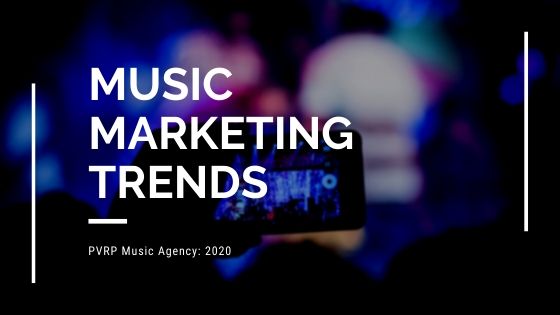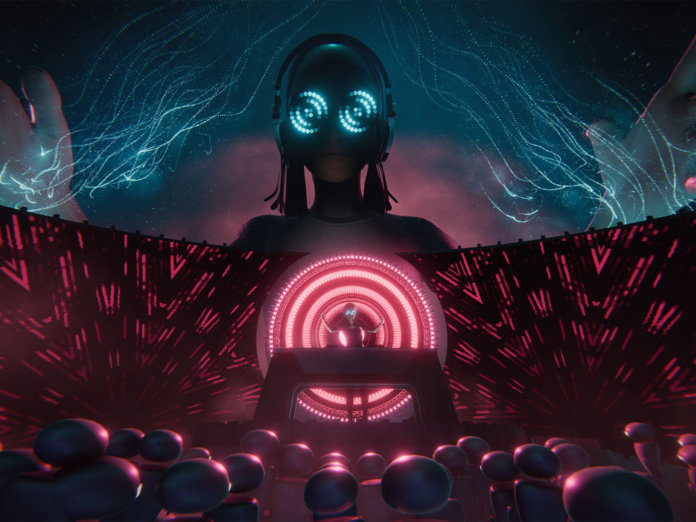Music Marketing Trends to Expect in 2020:
 By: Randall Peery
By: Randall Peery
AR/VR, Data, Brand Communities, Personalization, Micro-Moments
As 2019 comes to a close and we welcome in a new decade something seems to be clear, the internet has matured and we are in a new era of monetized immersive music marketing ecosystems.
We are now moving into the future of the music industry and it will demand that you step up your digital marketing presence and upping your marketing toolkit by using data to find out who your target audience really is, nurturing them and then converting them to paid subscribers by offering bonuses such as Interactive Media around micro-moments, VR concerts.
It may be just another year, but it will start to feel like a new decade as the media mergers and music business acquisitions settle and the major players such as the likes of Apple hit the road running.
1) Immersive Tech like AR and VR
Immersive tech like AR and VR will gain traction among music marketers as hardware, such as the Oculus, becomes more widely adopted and more brands come on board. Advertisers are also taking note of this boom with Facebook starting to test out paid ads for their AR filters
Wave is one company making a splash in what will be the next wave of the music industry, VR Concerts. They have previously collaborated with an impressive roster of artists including The Glitch Mob, Kill The Noise, TOKiMONSTA, Imogen Heap, REZZ, Jean-Michel Jarre and electronic violinist, Lindsey Stirling, among others. The recent Lindsey Stirling Wave attracted more than 400,000 live unique viewers from around the globe.
“The fan engagement is what makes the Wave experience so exciting”, Adam Arrigo continues. “Fans become active participants in the concert experience, chatting directly with the artist and each other, cheering and sharing reactions. This two-way dialogue and intimate interaction are what Wave is all about.”
2) Data
Leveraging data is increasingly important and doing so in a transparent and ethical way. Universal Music Group recently unveiled a new artist data portal to help artists and their teams deepen their understanding of their fans. Smarter data use will set you up for success in regards to nurturing your brand communities and many other important marketing tools that play into your holistic music marketing plan such as paid ads.
We are also seeing data being used to break new artists as algorithms become smarter. Another important tool for this is Shazam, if a song has good numbers on the platform, the algorithms in the Apple Music, Spotify and Amazon Prime ecosystems will know and that track will be added to MORE playlists making the track evermore popular. Yes, at this point, the growth of the song is geometric and will potentially go “viral”, which is key with promoting your music.
3) Video
Video marketing is an essential part of the image and brand that is portrayed to fans. Poor music video quality or not incorporating video is negatively impacting your success.
YouTube videos have been the leader for a while and thus you should have a strong presence with a fully branded channel.
As Gen Z starts to become the digital marketing focus it will be increasingly important to have a strong strategy on Tik Tok to get your fans to engage.
Don’t discount these newer platforms when planning your next lyric video, they have proven the success of helping artists exceed their music promotion goals, such as Lil Nas X.
4) Brand Communities
Once you have a solid understanding of who your audience is, it’s important to nurture this group as they are your ‘day-one’s’ and will become the most valuable digital marketing tool. Facebook has been adding more features to their groups which allows for a great place to reach your community, as well as traditional email marketing.
Your owned channels such as your website and apps are crucial for d2c as it will allow you to take ownership of your data and cut through the noise of algorithms. By doing so you set your brand up to be a lifestyle brand that people want to be associated with and will pay money to be a member which is key to market your music.
5) Personalization
Digital advertising has surpassed marketers and thus we will be relying more on AI and machine learning technology to deliver dynamic personalized ads to the right customer, at the right time, at the right place to make a conversion. Although this technology can be borderline creepy and has had its issues brought to light over the past few years through press reports specifically around Facebook advertising, it is still imperative to be using.
When done correctly people actually enjoy it, for example, Pandora has taken a cue from Spotify’s personalized playlists and recently rolled out a new personalized user interface. Using AI to personalize your advertising and data to find your audience you will be set up for success in achieving the ultimate goal of a brand influencer community.
6) Micro-Moments
Mobile has been dominating for several years now and moving into 2020 it will be important to get creative and start taking advantage of micro-moments. Micro-moments are impulse decisions that are made based on the fear of missing out or other reasons.
The primary example of this is shoppable social media feeds, and this will start to be combined with video and AR/VR for the ultimate experience.

7) New Faces of the Music Industry
We are no doubt in for a new era of music marketing, technology, and media with the new decade and with that brings fresh faces and competition to the forefront.
We recently saw the close of ViacomCBS and may see a partnership between Tik Tok and Universal Music Group in the near future, with these deals being made it means new opportunities and ways of doing business within the music industry. The Grammy’s now has competition with the Apple Music Awards. The Billboard charts will likely lose ground to Shazam or other players in the coming year.
However, at the end of the day, these deals won’t mean too much if they can’t get their fans to engage rather than forcing their audience to choose subscription services or other choices.


